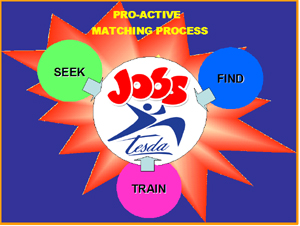Direction Setting
Crucial to TESDA's role as the TVET authority in the country is its capacity to steer and provide guidance to the sector. With the end in view of setting out clear directions and establishing priorities, the availability of timely, relevant and accurate information is of essence. Data gathered through the conduct of researchers and studies shall be disseminated to enable the TVET stakeholders to make informed decisions. With quality information, TVET policies and plans shall be formulated that will serve as the blueprint for TVET implementation in the country.
Policies, Plans and Information
Programs and services relating to these concern embody the role of TESDA as the authority in technical vocational education and training (TVET). These are aimed at providing clear directions and priorities for TVET in the country. These include the formulation of plans and policies for the TVET sector and the generation through researches and studies and the dissemination of relevant data and information for informed decision of stakeholders of the sector.
- National Technical Education Skills Development (TESD) Plan
- National Technical Education Skills Development (TESD) Research Agenda
- Philippine Technical Vocational Education and Training (TVET) System
- Philippine Technical Vocational Education and Training (TVET) Outlook
- Labor Market Intelligence Reports
- List of Technical Vocational Education and Training (TVET) Studies
- Technical Vocational Education and Training (TVET) Statistics
Pro-active Job Matching Process
 TESDA shall SEEK (jobs) through domestic and international market intelligence report to pinpoint specific job requirements. TESDA shall FIND (people) the right people who can be trained to fit the jobs in partnership with NGOs, social welfare agencies / institutions, school and community organizations. TESDA shal TRAIN (people) using standards of quality for TVET developed in consultation with various industry sectors. This pro-active matching process contributes to the best job-skills fit. TESDA also focuses on increasing productivity of implemented training programs by assisting individuals or groups who prefer to go into micro business, small and medium enterprises of enterprenuership training.
TESDA shall SEEK (jobs) through domestic and international market intelligence report to pinpoint specific job requirements. TESDA shall FIND (people) the right people who can be trained to fit the jobs in partnership with NGOs, social welfare agencies / institutions, school and community organizations. TESDA shal TRAIN (people) using standards of quality for TVET developed in consultation with various industry sectors. This pro-active matching process contributes to the best job-skills fit. TESDA also focuses on increasing productivity of implemented training programs by assisting individuals or groups who prefer to go into micro business, small and medium enterprises of enterprenuership training.
Standards Setting and Systems Development
Another pillar towards the realization of TESDA's authority role in the TVET sector is to ensure quality through the provision of standards and system development services. Competency assessment and certification of workers is continuously done in pursuit of professionalizing skilled workers.
- Competency Standards Development
- Competency Assessment and Certification
- Unified TVET Program Registration and Accreditation System
- Ladderized Education Program
- Skills Competition
Support to TVET Provision
In view to the need to provide equitable access and provision of TESD programs to the growing TVET clients, TESDA continues to undertake direct training provision. There are four training modalities - school-based, center-based, enterprise-based and community-based. These are being done with the TESDA's infrastructure in place - 57 administered schools, 60 training centers, enterprise-based training through DTS/Apprenticeship and community-based training in convergence with the LGUs.
- School Based Programs
- Center Based Programs
- Community Based Programs
- Enterprise Based Programs
- TESDA Language Skills Institutes
- Scholarship and Student Assistance Programs
- Career Guidance and Placement Programs
Institutional Capacity Building
For TESDA to provide the required services and live up to its core business, it must muster internal capacity and capability. It is necessary to build its competencies along various requirements of its responsibilities in direction setting, standards setting and systems development and in supporting TVET provision. Institutional capacity building also involves the installation of the TESDA quality management system at all levels of the organization.
